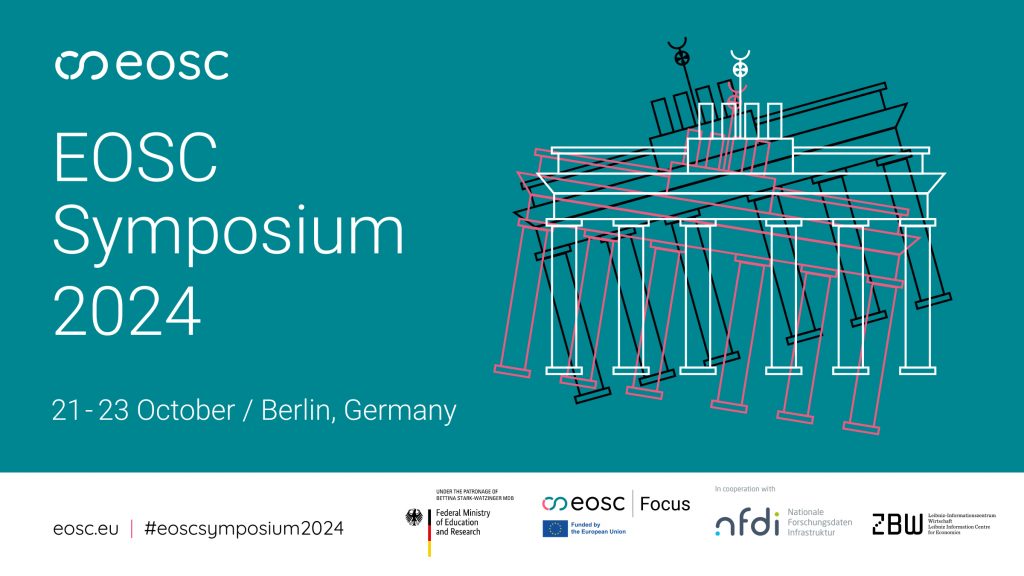This year’s EOSC Symposium is steadily approaching and the work has started to prepare an interesting, engaging and thought-provoking event for you! To ensure that the Symposium programme reflects the voice of the EOSC community, we would like to invite you to join us in shaping the programme through a call for posters.
This is an opportunity to give ample visibility to your personal, institutional, or national contributions to the implementation of the EOSC Strategic Research & Innovation Agenda (SRIA) objectives and take credit for your activities in supporting the implementation of EOSC! The EOSC Symposium will give visibility to 20 posters. This call is for the selection of use cases from the wider EOSC community.

Guidelines and criteria
Who can submit at poster?
- The call is open to regional, national, European, and global initiatives, and organisations and individuals contributing to the development and implementation of EOSC.
- We would especially like to encourage members of the NFDI community to send in proposals with use-cases.
Poster topics
Posters should focus on relevant contributions to EOSC, e.g. examples of the EOSC scientific, societal, or economic impact or of implementations advancing key topics within EOSC. Most importantly, all contributions should be open for others to use. Topics in focus:
- Example of EOSC scientific, societal, or economic impact: Please note that there are two sessions on the programme dedicated to this topic. The most relevant poster submissions on this topic might also be featured directly in those sessions,
- Development and implementation of standards relevant for the web of FAIR data,
- FAIR data implementation,
- New business opportunities emerging from FAIR data and services,
- Training & skills development for FAIR data management.
Format of the poster session
- Posters will be displayed in the poster area where coffee breaks will take place during the three days of the Symposium. Poster owners are expected to be at their posters at least during the breaks.
- Poster presenters must participate in the EOSC Symposium in Berlin in-person.
- The poster session room has a capacity of 20 posters.
How will posters be selected?
- 20 Posters will be selected in total.
- Poster proposals will be evaluated primarily on their potential to stimulate adoption of the use case. They should facilitate the exchange of ideas and promote collaboration.
Additional criteria
- Relevance to the general and specific objectives of the SRIA,
- Impact within the wider community,
- Innovation level,
- Originality,
- Openness of the solution, method or product,
- Quality of the abstract.
Special consideration will be given to ensure that a variety of topics and geographical range will be represented.
Please also note that applications on the topic “Example of EOSC scientific, societal, or economic impact” might also be incorporated directly in the related sessions of the main programme.
How to submit a poster
- Authors are asked to submit a short proposal of maximum 300 words, describing the content of the poster, via the form below. Deadline for submission is Sunday, 2 June 2024 (23:59 CEST).
- The language of the conference is English. The abstract and posters must be in English.
Call for posters timeline
The call for posters closed on 02 June 2024
- 2 June 2024: Abstract submission deadline
- 17 June 2024: Notification of acceptance and/or rejection
- 2 September 2024: Final poster submission in pdf format to freya.goeminne@belnet.be
- 21-23 October 2024: EOSC Symposium in Berlin
Posters presented at the EOSC Symposium 2024
Join us on 21-23 October 2024 in Berlin to explore the exciting topics listed below!
- The bridge between EOSC and public authorities: DECIDO-EOSC CC-4-PA | Xavier Salazar Forn, EGI Foundation
- Czech EOSC Working Groups: Development of ecosystem for FAIR data | Jaroslav Juracek, Masaryk University
- Pilot training programme (Master) in data management and data curation-MDMC | Mariarita de Luca, Area Science Park
- Finding interdisciplinary connections – Implementing FAIR research information in NFDI4Culture | Linnaea Soehn, Academy of Sciences and Literature | Mainz
- FAIR digital twins of protein variants for pandemic preparedness | Lilli Schuckert, Leiden Institute for Advanced Computer Science
- Blue-Cloud 2026 – Federating European FAIR and open research ecosystems | Dick Schaap, MARIS / Blue-Cloud 2026
- FAIR data for energy systems research | Oliver Werth, OFFIS
- Decentralised and collaborative: HeFDI data school RDM training | Stephanie Werner, Darmstadt University of Applied Sciences
- de.KCD: German Competence Center Cloud-Technologies for data management and processing | Sebastian Jünemann, Forschungszentrum Jülich
- OSTrails: Delivering the commons to plan-track-assess research in EOSC | Elli Papadopoulou, ATHENA Research Center
- The NFDI knowledge graph infrastructure service for FAIR data management | Lozana Rossenova, TIB – Leibniz Information Centre for Science and Technology
- OpenCitations: redesigning an open infrastructure according to the FAIR principles | Silvio Peroni, University of Bologna
- Base4NFDI: Supporting RDM activities via sustainable core services | Melina Jander, State and University Library Goettingen
- Quality standards for services: the use case of the OGS | Alessandra Giorgetti, Istituto Nazionale di Oceanografia e di Geofisica Sperimentale
- Galaxy Europe – An IT infrastructure for FAIR data analysis | Jérôme Detoc, IFREMER
- ASSURED. A training and accreditation service for safe research | Simon Parker, DKFZ
- ELIXIR and the EOSC ecosystem | Jonathan Tedds, ELIXIR Europe
- Research commons – an opportunity for European research infrastructure | Tilo Mathes, Research Space
- Elevating cloud storage systems into FAIR digital objects | Katja Jansen, IT Center of the RWTH Aachen University
- Enabling large N-dimensional imaging data in EOSC with OME-Zarr | Christian Schmidt, DKFZ